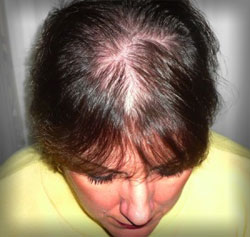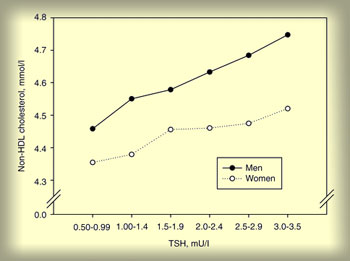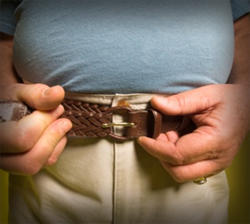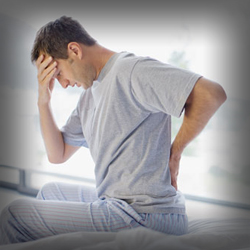Signs of Thyroid Problems
There are many different signs of thyroid problems that you can take in account if you think that you might be hypothyroid. But don’t fall into the trap of thinking that you have to experience all of the various hypothyroidism symptoms because it varies widely from person to person.
But there are some that tend to be more common than others.
Below, I’ve covered some of the more common signs of thyroid problems that you can take into account along with some more medically oriented tests that you can do that are oftentimes a better indicator.
Physical Signs of Thyroid Problems
There are many physical signs of thyroid problems and below I’ll discuss a few of the more common ones. But just because you don’t exhibit physical signs, it doesn’t necessarily mean that you’re in the free and clear.
Professional athletes are a good example of this. Because of the demands of their sport, they oftentimes appear to be in great physical shape. But most athletes are hypothyroid because of the consistent stress they put on their bodies.
Weight
Not only your weight, but your ability to lose weight is oftentimes one of the big signs of thyroid problems. Because hypothyroidism tends to decrease your metabolism, you naturally burn fewer calories. But your body still needs the same amount of nutrients in order to properly function. And you can only cut calories so far before you start seeing the effects of nutrient deficiencies.
Water Retention
When your metabolism slows, your cells begin to absorb more water than normal. And this causes all of your cells including muscle, nerves, and fat cells to swell, causing edema.
Oftentimes there will be noticeable swelling of the ankles and abdomen. And much the weight gain that you experience can be water weight.
Puffiness
Another one of the common signs of thyroid problems is puffiness, especially of the face. And this is completely unrelated to weight. Even extremely skinny people can show puffiness, although it’s oftentimes not easily noticeable until after the hypothyroidism treatment has taken place and the difference is compared.
Swelling is most noticeable within the face, around the eyes and eyelids.
Hair, Skin, and Nails
 Your hair can go through some noticeable changes when you suffer from hypothyroidism. More often than not, your hair becomes dry, course, and brittle.
Your hair can go through some noticeable changes when you suffer from hypothyroidism. More often than not, your hair becomes dry, course, and brittle.
Other hair related hypothyroidism symptoms include hair loss or thinning, from all areas of your body, including your head. And the loss of hair from the outer portion of your eyebrows as well as the loss of eyelashes.
Skin changes are yet another one of the many signs of thyroid problems. Much like your hair, your skin oftentimes becomes dry, thick, scaly, and coarse.
You nails can become more brittle, flaky, and begin to peel.
And many people notice a yellowish pigment to their skin and oftentimes dark circles underneath their eyes.
Cold Extremities
One of the most common signs is feeling cold, especially your extremities. But this also largely depends on the air temperature around you because if the air is relatively warm then you most likely won’t notice the difference.
A better indicator of cold extremities is to place your hand on your chest, underneath your shirt. This will give a good comparison of the difference between your core temperature and the temperature of your extremities. If your hand feels cold to your chest then this is a sign of hypothyroidism.
Mental Signs of Thyroid Problems
Another one of the more common signs of thyroid problems is the loss of mental ability that comes with it.
You can probably remember times of your life when you were younger when your mind was alert and quick to respond to just about anything. But now you suffer from mental sluggishness and you have a hard time concentrating on any task at hand.
And where the heck did you put your car keys?
Poor memory and concentration are two of the ill effects of hypothyroidism. And they typically are followed by a lack of motivation.
Medical Signs of Thyroid Problems
There are a multitude of physical signs of thyroid problems and I’ve listed some of the more common ones above. But there are also some very important medical signs that you should know about, which most people are completely unaware of.
Elevated Cholesterol
 Did you know that your cholesterol levels were directly proportional to your thyroid function? The lower your thyroid function, the higher your cholesterol.
Did you know that your cholesterol levels were directly proportional to your thyroid function? The lower your thyroid function, the higher your cholesterol.
Studies have shown that when you treat your thyroid then your cholesterol levels fall to normal exactly at the same rate that your thyroid function returns to normal.
So why are you trying to use drugs to force your cholesterol down when your cholesterol isn’t the real problem? It doesn’t make sense to me either. And it makes perfect sense why cholesterol lowering drugs do NOT improve your risk of heart disease.
But now, you’re becoming educated and can understand that your high cholesterol is just one of the many signs of thyroid problems.
Low Morning Temperature
This is one of those pseudo-medical signs of thyroid problems because this is something that you can do in the comfort of your own home without the need of a doctor or fancy medical equipment. All you need is a thermometer and a night’s sleep.
If you take your basal (morning) temperature before you get out of bed in the morning, just after waking, then it has been shown to be a pretty accurate indicator of hypothyroidism.
If you’re morning temperature is 97.9° F (36.6° C) or lower, then your thyroid is struggling to keep your temperature up and you are hypothyroid.
Slow Achilles Reflex
The last of the signs of thyroid problems that I want to discuss is the Achilles reflex. When you become hypothyroid, your nerve reflexes slow down considerably. So oftentimes, before the popular lab testing of today, doctors used to test the Achilles reflex as one of the many indicators of hypothyroidism.
By simply propping your bent knee on a chair with your ankle hanging free, you can have someone trigger your Achilles reflex.
If your thyroid is functioning normally then your foot will quickly reflex and return to its normal resting position. If you are hypothyroid then your foot will quickly reflex but then it will be slower to return to its normal resting position. Some have even equated it to the effect of a pneumatic door that opens quickly but is slow and steady to return to its closed position.
So, there you have it. I’ve given you not only many of the physical and mental signs of thyroid problems but also some simple medical based tests that can give you even a better indicator of whether or not you are experiencing true hypothyroidism symptoms or if they are most likely related to something else. But keep in mind that as you age, your thyroid function naturally declines. So, eating according to a good hypothyroidism diet is always recommended to maintain the best of health.

 Weight gain is yet another symptom that most men completely write off as a byproduct of age. You may have been an avid athlete in your youth but today, your weight is beyond your control.
Weight gain is yet another symptom that most men completely write off as a byproduct of age. You may have been an avid athlete in your youth but today, your weight is beyond your control. Hypothyroidism is also the cause of a lot of muscle aches, pains, cramps, tenderness, and stiffness as well as pain and swelling in the joints.
Hypothyroidism is also the cause of a lot of muscle aches, pains, cramps, tenderness, and stiffness as well as pain and swelling in the joints.